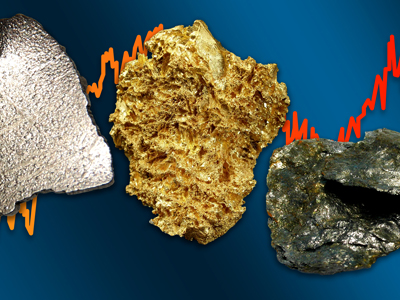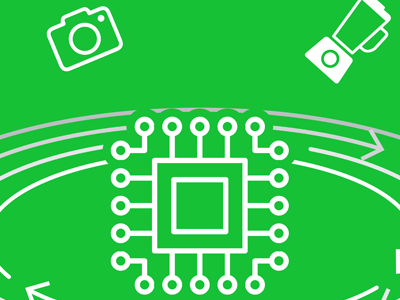Overview
Learn about waste management and its key role in saving critical raw materials. Gain practical knowledge of the circular economy, recycling, refurbishment, and remanufacturing as a means of identifying new business opportunities.
How can we ensure the continuous supply of the increasingly scarce raw materials that are needed to make the products we use every day? In this course, we will look at the potential benefits of circular procurement and how recycling technologies and more efficient ways of collecting and recycling critical raw materials (CRMs) can make your business and production more resource resilient.
A good number of the materials found in everyday products are now referred to as "critical". This means that there is a risk of failure in their supply and that they are also critical in terms of economic importance.
Many metals, for instance, are already critical or could become critical in the near future due to their limited availability and the growing demand for products worldwide. Think of the newest electronic products that contain critical metals such as gallium, which is used in integrated circuits; beryllium, used in electronic and telecommunications equipment and permanent magnets and germanium found in infra-red optics.
Innovative product design and reusing, recycling and remanufacturing products can help to deal with a raw materials shortage. But this can only provide an integrated solution if we keep CRMs in the loop through smarter CRM management. The starting point is to identify CRMs in products. It is not always clear what materials are in which products. It is, therefore, necessary to keep all metals in the loop for as long as possible.
Scarcity in the supply chain can not only damage businesses but also negatively impact economic development and the environment. For this reason, the course will also discuss environmental issues and electric and electronic waste regulations.
This course will be of value to a wide range of professionals working in or interested in this field. These include professionals involved in producing products containing CRMs (such as electronics) as well as local or national government officials tasked with organizing waste management and recycling for these products. Students interested in the field of waste management will also find this course helpful for their studies in electronics, industrial design, and industrial ecology.
What you'll learn:
- Current challenges and opportunities in resource resilience
- Environmental problems caused by waste mismanagement of products that contain CRMs
- Waste collection methods and efficient collection of waste in households and at companies
- Remanufacturing, refurbishment, re-use and recycling processes of products which contain CRMs
- Waste prevention through chain optimization
- Benefits of circular procurement to keep critical raw materials in the loop through smart waste management
- How product design can support efficient recycling and remanufacturing
- How to uncover new business models to reduce waste and to make your business more resource resilient

This course has received funding from the European Institute of Innovation and Technology (EIT), a body of the European Union, under the Horizon 2020, the EU Framework Programme for Research and Innovation.

Details
Course Syllabus:
Week 1: Urgency and challenges with CRMs and waste. How can we find out what CRMs are in products, and how can we get them back? The effects of materials shortage, future development and geo-politics on raw materials. Current waste management of products containing CRMs in general, waste management of commercial and household waste, regulation of electric and electronic waste (WEEE). Environmental problems such as leaching heavy metals from incinerator ashes and landfills. Partial metals retrieval from incinerator ashes.
Week 2: Different collection systems for recycling and remanufacturing/refurbishment, recycling psychology and the separate waste collection of commercial and household waste.
Week 3: Recycling technology: pre-processing, metallurgy and its challenges. Recycling economics and the problem of <1% (most) CRMs recycling.
Week 4: Remanufacturing and refurbishment systems: return of product (reverse logistics), disassembly and repair of the product, market demand and economics.
Week 5: Product design using better recycling or remanufacturing and refurbishment. Substitution of materials.
Week 6: New business models to generate profits from products that last longer. Circular procurement for government and companies.
Other instructors:
Colin Fitzpatrick
Senior Lecturer in Electronic & Computer Engineering - University of Limerick, Ireland
Michael Johnson
Post-doctoral researcher - University of Limerick, Ireland
Kamila Mascart
Bioengineer - Ghent University, Belgium
Sophie Sfez
Post-doctoral researcher - Ghent University, Belgium
Florence Betmont
Engineer in Environmental Science and Chemical Engineering - University of Grenoble Alps
Maud Rio
Associate Professor - University of Grenoble Alps
License
Unless otherwise specified, the Course Materials of this course are Copyright Delft University of Technology and are licensed under a Creative Commons Attribution-NonCommercial-ShareAlike 4.0 International License.
Qualifications
Chartered Engineering Competences
All our online courses and programs have been matched to the competences determined by KIVI’s Competence Structure, a common frame of reference for everyone, across all disciplines, levels and roles.
These competences apply to this course:
- A1: Extend your theoretical knowledge of new and advancing technologies.
- E3: Undertake engineering activities in a way that contributes to sustainable development and a circular economy.
Admission
This is a Massive Open Online Course (MOOC) that runs on edX.
Prerequisites
Secondary school (high school) chemistry; basic business concepts.


